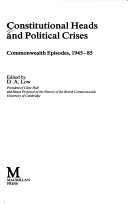Cambridge Commonwealth
2 total works
This selection of essays examines some of the constitutional crises throughout the Commonwalth since the Second World War, from Australia, Ceylon, Pakistan, Nigeria, Fiji, India, Grenada, Malaysia and Canada. Constitutional crises in which a Governor-General suddenly becomes deeply and personally involved have occurred many times over recent years. The fundamentals of Britains's system of constitutional monarchy, in which a non-executive constitutional head of state is sharply distinguished from a political head of government, has now been extensively replicated throughout the Commonwealth. In all, around 85 analoges of the British system can be listed there. Not only are these to be found in countries whose constitutional heads of state are Governors-General (such as Jamaica or New Zealand), or non-executive Presidents (such as India or Zimbabwe), or hereditary Kings (such as Swaziland or Tonga), but in the Canadian provinces, the Malaysian Sultanates, and the Indian and Australian states.
Despite the fact that the number of such offices has increased very substantially since so many Commonwealth countries became independent in the years following the Second World War, very little attention has been given to how these offices ordinarily function, how their holders have generally performed, or what they have done when they have been faced by a politico-constitutional crisis. While it is unusual for a Governor-General to dismiss a Prime Minister (as in Australia in 1975) or to try to curb a military coup (as in Fiji in 1987), the occasions when such constitutional heads of state have necessary become publicly involved have been far more numerous than is ordinarily appreciated.
Despite the fact that the number of such offices has increased very substantially since so many Commonwealth countries became independent in the years following the Second World War, very little attention has been given to how these offices ordinarily function, how their holders have generally performed, or what they have done when they have been faced by a politico-constitutional crisis. While it is unusual for a Governor-General to dismiss a Prime Minister (as in Australia in 1975) or to try to curb a military coup (as in Fiji in 1987), the occasions when such constitutional heads of state have necessary become publicly involved have been far more numerous than is ordinarily appreciated.
Most general political histories of modern South Asia focus on India and the Indian National Congress and tell us little about Pakistan. Most accounts of the background to the independence of Pakistan serve to explain why Pakistan was created. They tell us little about the Pakistan that was actually created. This book discusses the pre-1947 histories of those parts of the South Asian sub-continent that territorially became the original Pakistan so as to provide a more substantial introduction to the distinctive history of Pakistan after Independence than has so far been available.

